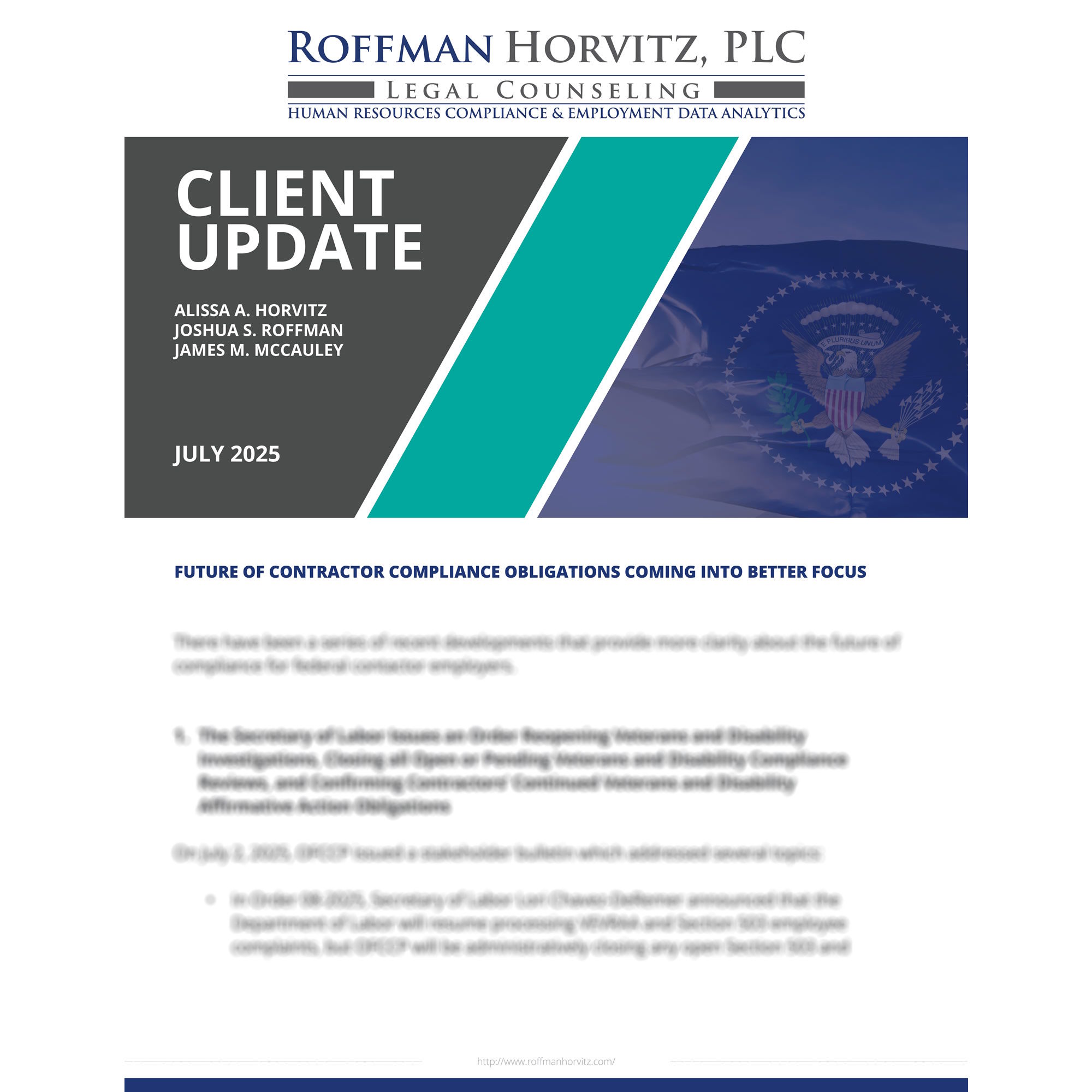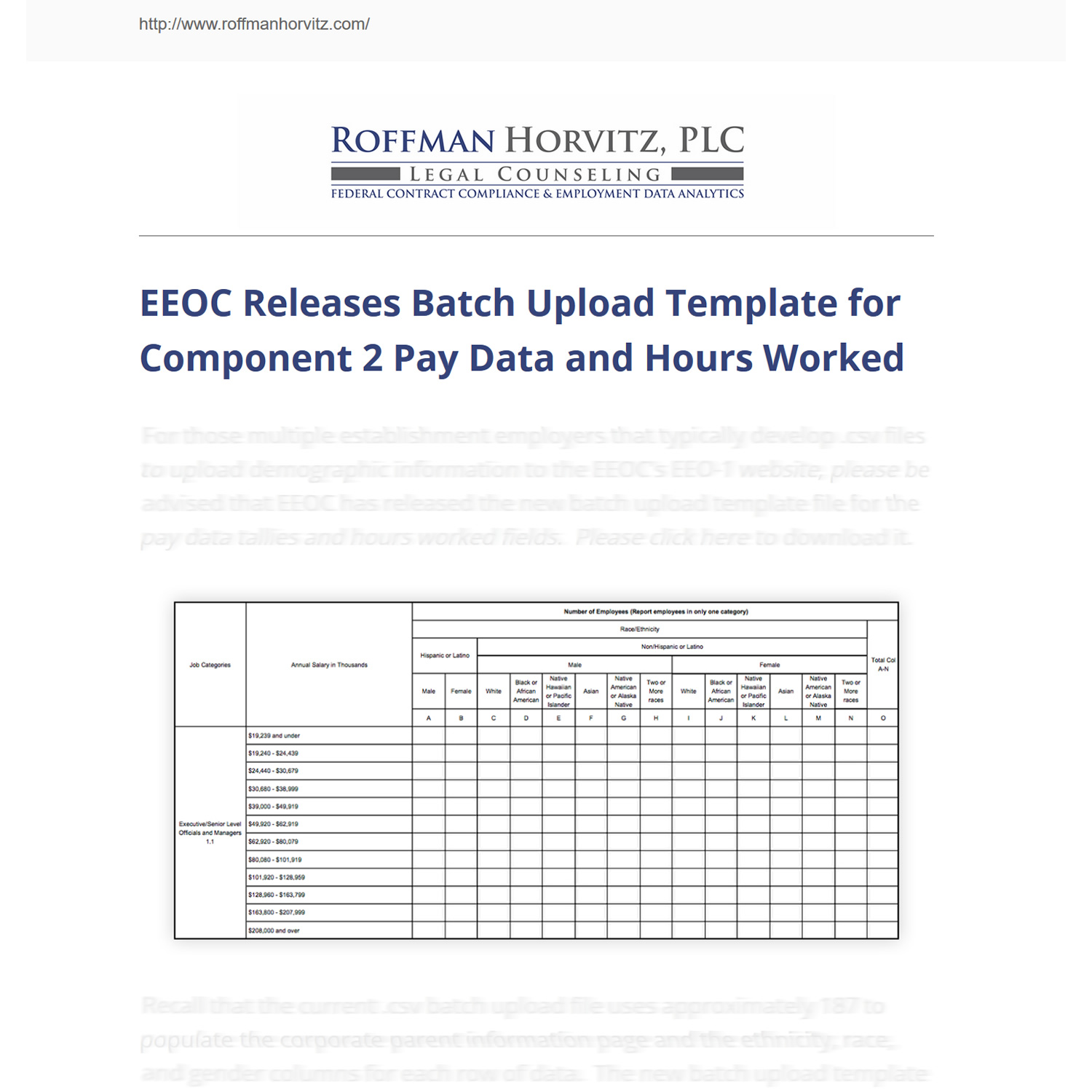FAR Council Proposes to Require All Federal Government Contractors and Subcontractors to Publish Compensation Information in Job Advertisements and to Prohibit Use of Pay History to Set Initial Salary

FAR Council Proposes to Require All Federal Government Contractors and Subcontractors to Publish Compensation Information in Job Advertisements and to Prohibit Use of Pay History to Set Initial Salary
The FAR Council is proposing a rule that would:
- Prohibit contractors and subcontractors from seeking and considering information about job applicants' compensation history when making employment decisions about personnel working on or in connection with a government contract; and
- Require contractors and subcontractors to disclose, in all advertisements for job openings involving work on or in connection with a government contract placed by or on behalf of the contractor or subcontractor, the compensation to be offered to the hired applicant, for any position to perform work on or in connection with the contract.
This obligation would arise out of the contract itself. When an organization observes that the new FAR clause is included in its contract with the federal government, these two requirements would become effective, and the prime or direct contractor would have an obligation to flow down the clauses to subcontractors at all tiers. Procurement and Talent Acquisition are going to need to stay informed and coordinate, once these obligations become final. Roffman Horvitz intends to submit comments in response to this proposed rule, and we are soliciting your feedback at the end of this Client Update.
In what types of contracts will this language appear? It will apply to contracts and subcontracts for commercial products and commercial services containing the proposed FAR clause. The Exchange (AAFES) is not subject to FAR.
Will this apply to the acquisition of Commercial-Off-The-Shelf (COTS) Items? Yes.
Will it apply to contracts performed outside the United States? No. It will apply only to contracts performed in the United States, but “United States” includes all territories and outlying areas.
Is there a minimum contract dollar threshold? Yes, it will apply to contracts and subcontracts of $10,000 and greater.
When will this obligation begin? The rule is only in its proposed phase. The FAR Council will be accepting comments on this proposed rule until April 1, 2024 (60 days from the January 30, 2024 publication date lands on March 29, 2024, which is a weekend, and thus the deadline becomes the next business day).
What does the Proposed Rule require? What will I be required to do?
- The FAR clause will prohibit contractors
- from seeking an applicant's compensation history either directly or indirectly
- from requiring disclosure of compensation history as a condition of an applicant's candidacy, and
- from retaliating against any applicant for failing to respond to an inquiry regarding their compensation history.
- The FAR clause also will prohibit a contractor from relying on an applicant's compensation history even if the applicant volunteers their compensation history without prompting at any stage in the selection process.
- Notably, an “applicant” is defined as a prospective employee or current employee applying for a position to perform work on or in connection with the contract. (emphasis added) Thus, when an employer announces a job posting internally, these disclosure obligations will apply.
- The FAR Clause will require contractors to disclose the compensation to be offered to the hired applicant in the solicitation or advertisement placed by or on behalf of the contractor for any position to perform work on or in connection with the contract. The disclosure can be done either as part of (a) the job announcement or (b) the application process.
- The disclosure must indicate the salary or wages, or range thereof, that the contractor in good faith believes that it will pay for the advertised position and may reflect, as applicable, the contractor's pay scale for that position, the range of compensation for those currently working in similar jobs, or the amount budgeted for the position.
- The disclosure must also include a general description of the benefits and other forms of compensation applicable to the job opportunity.
- Where at least half of the expected compensation for the advertised position is derived from commissions, bonuses, and/or overtime pay, the contractor must specify the percentage of overall compensation or dollar amount, or ranges thereof, for each form of compensation, as applicable, that it in good faith believes will be paid for the advertised position.
- The proposed new clause will require employers to provide any applicants that are covered by the prohibitions and disclosure requirements with a notice of their rights, either as part of the job announcement or application process.
- The FAR Council has developed specific language, along with a fill-in blank line where the employer would inform the applicant of the federal agency that issued the solicitation or awarded the contract.
- The applicant can file a complaint with that agency if the applicant believes that the employer is noncompliant.
- For employers that have contracts with multiple federal agencies, the complainant is advised to copy the central collection point of “all known agencies” to be supported by the applicant's position.
- The list of agency points of contact may be found here: https://www.dol.gov/general/labor-advisors
- The notice informs applicants that they have 180 days in which to file a complaint.
- Applicants alleging discrimination (in compensation) on the basis of race, color, religion, sex, sexual orientation, gender identity, national origin, disability or protected veteran status should file their complaint with OFCCP. If a complaint alleging discrimination in compensation is submitted to an agency central collection point rather than OFCCP, the agency will forward the complaints to OFCCP.
Am I still allowed to ask an applicant, “What are your salary expectations”? Yes.
Does this proposed rule appear to prohibit an employer from using a current employee's salary history to set new compensation when an employee applies for a transfer or promotion? Yes.
What is the remedy if the contracting agency finds that the employer has not complied with the proposed clause? “The contracting agency will review the complaint, consult with the complainant as necessary to confirm the complainant is a covered applicant, and take action as appropriate.”
This is very broad! How am I supposed to know if an employee is going to be working on a contract or in connection with a federal contract? That's the point of the proposed rule: to completely change the marketplace for compensation transparency. The FAR Council states:
Comments to the FAR Council
Roffman Horvitz intends to submit comments in response to this proposed rule. We would appreciate your email feedback on the following topics:
- Are you complying already because you operate in states that require this? Or will this obligation be new to your organization?
- If you currently are complying,
- Are you complying only for external job postings, or all job postings, including competitive internal transfers and promotions?
- If you're complying with the salary transparency disclosure requirements only for external applicants, what would be the estimated cost and/or impact for you to have to comply for internal job postings, too?
- Does your organization have a policy or practice of giving a set percentage increase when promoting an employee? (Tying the employee's new promotion salary increase to a percentage increase off the existing salary base?) Or does your organization place the promoted employee into the new range without regard to the employee's current base pay?
- Is this proposed rule going to require you to engage any software development engineers to modify your applicant tracking system or any other method you are using to communicate job announcements to applicants? Thoughts on cost or the amount of time needed once the rule is finalized for your organization to comply?
- Is your organization concerned about applicants filing complaints simultaneously in multiple jurisdictions (either with multiple states or with the federal agencies at the same time the applicant is pursuing a state complaint)?
- The proposed mandatory disclosure to applicants is 284 words, 2 pages, 2013 characters, and 37 lines. Any concerns with having to tailor each individual notice to include the agency which with the applicant primarily would work?
- Shouldn't the FAR Council explain how this notice would work for applicants who are being hired before any contract has been awarded?
Download PDF of Client Update
Supporting Documents

